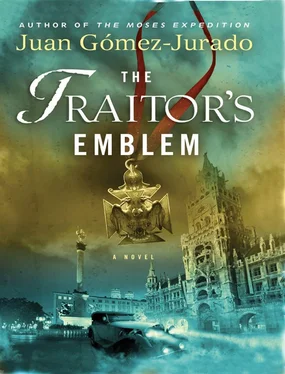Juan Gomez-Jurado - The Traitor's emblem
Здесь есть возможность читать онлайн «Juan Gomez-Jurado - The Traitor's emblem» весь текст электронной книги совершенно бесплатно (целиком полную версию без сокращений). В некоторых случаях можно слушать аудио, скачать через торрент в формате fb2 и присутствует краткое содержание. Жанр: Триллер, на английском языке. Описание произведения, (предисловие) а так же отзывы посетителей доступны на портале библиотеки ЛибКат.
- Название:The Traitor's emblem
- Автор:
- Жанр:
- Год:неизвестен
- ISBN:нет данных
- Рейтинг книги:4 / 5. Голосов: 1
-
Избранное:Добавить в избранное
- Отзывы:
-
Ваша оценка:
- 80
- 1
- 2
- 3
- 4
- 5
The Traitor's emblem: краткое содержание, описание и аннотация
Предлагаем к чтению аннотацию, описание, краткое содержание или предисловие (зависит от того, что написал сам автор книги «The Traitor's emblem»). Если вы не нашли необходимую информацию о книге — напишите в комментариях, мы постараемся отыскать её.
The Traitor's emblem — читать онлайн бесплатно полную книгу (весь текст) целиком
Ниже представлен текст книги, разбитый по страницам. Система сохранения места последней прочитанной страницы, позволяет с удобством читать онлайн бесплатно книгу «The Traitor's emblem», без необходимости каждый раз заново искать на чём Вы остановились. Поставьте закладку, и сможете в любой момент перейти на страницу, на которой закончили чтение.
Интервал:
Закладка:
He took the newspaper he had been carrying under his arm and held it in front of the old man’s face, close enough so that he could read it. Meanwhile he recited the contents of the article from memory. He had read it over and over the night before, anticipating the moment when the old man would see it.
MYSTERIOUS BODY IDENTIFIED
Munich (Editorial). The police have finally been able to identify the body found last week in an alley close to the Hauptbahnhof. It is the body of former marine lieutenant Clovis Nagel, who since 1904 had an outstanding summons to a court-martial for having deserted his post during a mission to South-West Africa. Although he had returned to the country under a false name, the authorities were able to identify him from the large number of tattoos covering his torso. There are no further details regarding the circumstances surrounding his death, which as our readers will recall happened following a fall from a great height, possibly as a result of being pushed. The police have reminded the public that anyone who had contact with Nagel is under suspicion, and request that those with information make themselves known to the authorities immediately.
“Paul’s back. Isn’t that superb news?”
A glimmer of fear flickered in the baron’s eyes. It lasted only a few seconds, but Jurgen savored the moment as though it were the great humiliation his twisted mind had envisaged.
He got up and walked over to the bathroom. He took a glass and half filled it under the tap. Then he sat down next to the baron once more.
“You know he’ll come for you now. And I don’t imagine you want to see your name in the headlines, isn’t that right, Otto?”
Jurgen took a metal box no bigger than a postage stamp from his pocket. He opened it and extracted a small green pill, which he left on the table.
“There’s a new branch of the SS that’s experimenting with these lovely things. We have agents all over the world, people who at any given moment might have to disappear silently and painlessly,” said the young man, neglecting to mention that the painlessness had not yet been achieved. “Spare us the shame, Otto.”
He picked up his cap and pulled it firmly back on his head, then walked over to the door. When he reached it, he turned and saw Otto groping for the tablet. His father held the pill between his fingers, his face still as blank as it had been throughout Jurgen’s visit. Then his hand rose to his mouth so slowly that the movement was almost imperceptible.
Jurgen left. For a moment he was tempted to stay and watch, but it was better to stick to the plan and avoid potential problems.
From tomorrow, the staff will address me as Baron von Schroeder. And when my brother comes looking for answers, he’ll have to ask me.
48
Two weeks after Nagel’s death, Paul finally dared to go back outside.
The sound of the ex-marine’s body hitting the ground had echoed in his mind the whole time he’d spent closed away in the room he’d rented in a Schwabing boardinghouse. He had tried going back to the old building he’d shared with his mother, but it was now a private apartment block.
That wasn’t the only thing that had changed in Munich during his absence. The streets were cleaner and there were no longer groups of the unemployed loitering on street corners. The queues outside churches and employment offices had disappeared, and people didn’t have to lug around two suitcases of small banknotes every time they wanted to buy bread. There were no bloody tavern brawls. The enormous columns of notices, which could be found on the main roads, had other things to report. Previously they had been packed with news of political meetings, fiery manifestos, and dozens of “Wanted for Theft” posters. Now they displayed peaceful things such as meetings of horticultural societies.
In place of all these omens of doom, Paul found that the prophecy had been fulfilled. Everywhere he went he saw groups of boys wearing red swastika armbands. Passersby had to raise their arm and shout “Heil Hitler!” if they didn’t want to risk being tapped on the shoulder by a couple of plainclothes agents with an order to come along with them. A few, the minority, scurried off into doorways to escape the salute, but that solution wasn’t always possible, and sooner or later everyone had to raise his or her arm.
Everywhere you looked, people were displaying the flag with the swastika, that mischievous black spider, whether on tiepins, armbands, or kerchiefs tied around their necks. They were sold at trolley stops and kiosks alongside tickets and newspapers. This burst of patriotism had started at the end of June, when dozens of SA leaders were killed in the middle of the night for “betraying the fatherland.” With this action, Hitler had sent out two messages: that nobody was safe and that in Germany he was the only person in charge. Fear was etched on every face, however much people tried to hide it.
Germany became a death trap for the Jews. With every passing month, the laws against them grew more restrictive, the injustice silently tightening around them. First the Germans went after the Jewish doctors, lawyers, and teachers, stripping them of jobs they coveted and, in the process, making it impossible for these professionals to earn a living. The new laws meant that hundreds of mixed marriages were now nullified. A rash of suicides unlike anything Germany had ever seen swept across the country. And still there were Jews who looked the other way or were in denial, insisting things weren’t really that bad, partly because few knew how far-reaching the problem was-the German press barely wrote about it-and partly because the alternative, emigration, became more complicated every day. Because of the global economic crisis and a job market saturated with skilled professionals, leaving seemed like madness. Whether they realized it or not, the Jews were being held hostage by the Nazis.
The walk through the city brought Paul some small measure of relief, although this was at the cost of the concern he felt for the direction Germany was heading.
“You want a tiepin, sir?” a young lad called, after having looked him up and down. The boy was wearing a long leather sash showcasing several models, everything from the simple twisted cross to an eagle holding the Nazi crest.
Paul shook his head and walked on.
“You’d do well to wear one, sir. An excellent sign of your support for our glorious Fuhrer,” the boy insisted, running along behind him.
Seeing that Paul wasn’t giving in, he stuck out his tongue and went in search of new prey.
I’ll die before I wear that symbol, thought Paul.
His mind plunged back into the feverish, nervous state it had been in since Nagel’s death. The story of the man who had been his father’s first lieutenant had besieged him with doubts, not only about how to continue his investigation but also about the nature of that search. If he were to believe Nagel, Hans Reiner had lived a life that was complex and twisted, and he had committed a crime for money.
Of course, Nagel was not the most trustworthy of sources. But in spite of that, the song he’d sung was not out of tune with the note that had always sounded in Paul’s heart when he thought about the father he had never known.
As he looked at the calm, clear nightmare into which Germany was plunging so enthusiastically, Paul wondered whether he wasn’t finally waking up.
Last week I turned thirty, he thought bitterly as he walked along the bank of the Isar, where couples gathered on benches, and I’ve wasted more than a third of my life looking for a father who might not have been worth the effort. I left the person I loved, and have found nothing but sadness and sacrifice in exchange.
Читать дальшеИнтервал:
Закладка:
Похожие книги на «The Traitor's emblem»
Представляем Вашему вниманию похожие книги на «The Traitor's emblem» списком для выбора. Мы отобрали схожую по названию и смыслу литературу в надежде предоставить читателям больше вариантов отыскать новые, интересные, ещё непрочитанные произведения.
Обсуждение, отзывы о книге «The Traitor's emblem» и просто собственные мнения читателей. Оставьте ваши комментарии, напишите, что Вы думаете о произведении, его смысле или главных героях. Укажите что конкретно понравилось, а что нет, и почему Вы так считаете.












